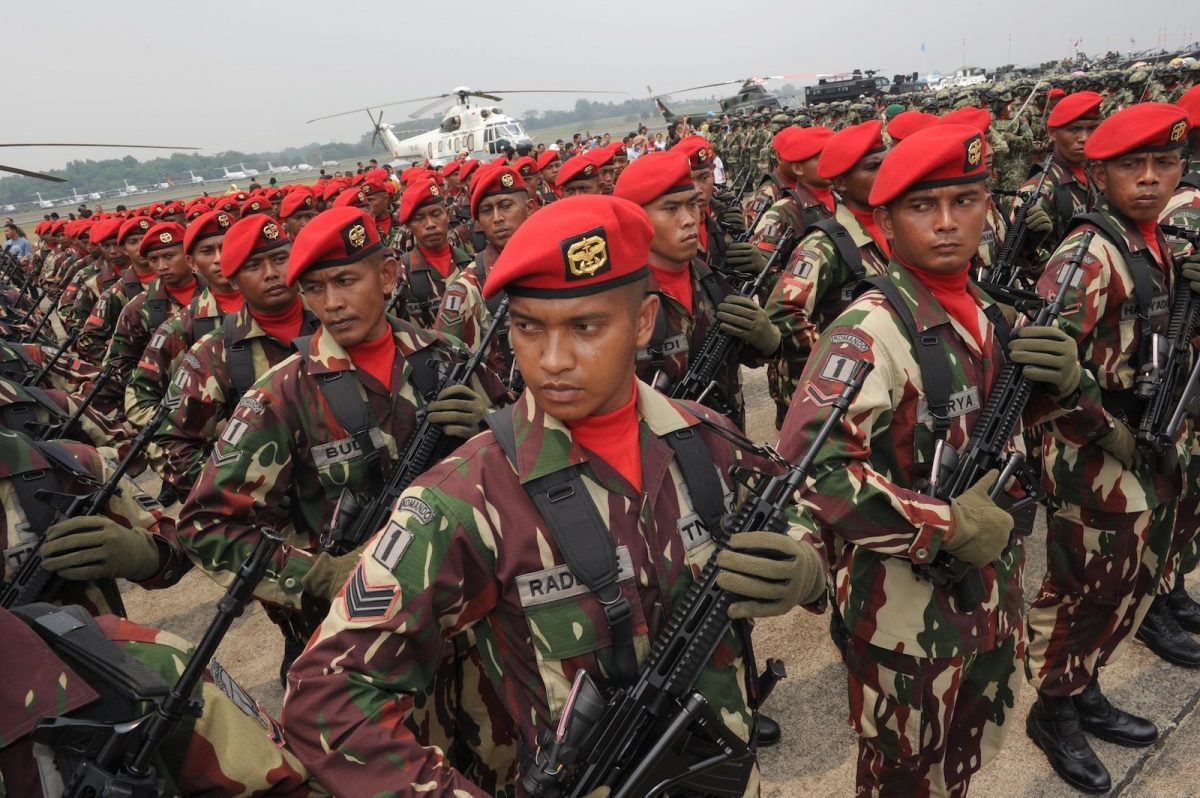Global Courant 2023-05-16 16:24:02
JAKARTA – More than two decades ago, democratic reforms ended the dwifungsi (dual function) role of the Indonesian military that had underpinned the 32-year rule of authoritarian leader President Suharto since the anti-communist bloodshed of the 1960s.
In doing so, the uniformed branch was effectively removed from the political equation, even though it has retained significant clout through a nationwide territorial structure and an unparalleled public image.
Now, a proposed revision to the 2004 Indonesian Armed Forces (TNI) law that would weaken the president’s authority over the military and allow more officers to serve in the bureaucracy is making waves in both military and civilian circles.
Even Defense Secretary Prabowo Subianto, a potential candidate for next year’s presidential election, doesn’t see the need to tinker with legislation he says has been effective in preserving the principle of civilian supremacy.
Some retired generals are totally opposed to a TNI bill, arguing that other nations rely not on legislation but on doctrine and protocol to keep their militaries aligned. “Why,” asked a three-star pensioner, “do they always try to put us in a cage.”
Dwifungsi was first introduced during a period of martial law in 1957 and then expanded when Suharto came to power ten years later with “every effort and activity of the people in ideology, politics and economics and in socio-cultural area.”
By 1980, serving military personnel held as many as 8,156 positions at all levels of government, from mayors and provincial governors to ambassadors, state-owned company executives, lawyers, legislators, and cabinet ministers.
That was reduced to about 6,000 by 1995, but despite the reforms that followed Suharto’s demise four years later, finding jobs for the boys became an increasingly difficult problem in an institution with shrinking duties.
It’s unclear who is driving the changes, but analysts point out that a proposed extension of the retirement age for some senior positions from 58 to 60 would allow TNI chief Admiral Yudo Margono to stay on past November, when his short term of 11 months expire.
Other analysts speculate the overall move could be in response to what has been called “mission creep” by the well-funded national police and their ever-dominant role in the security framework, which doesn’t sit well with army generals.
An army soldier checks a resident’s body temperature before retrieving rice from an automated machine ATM rice as government aid during the Covid-19 outbreak at a military district command in Jakarta, Indonesia on May 5, 2020. Photo: Anton Raharjo / Anadolu Agency via AFP
Political activists are not happy with whatever happens. “The revision of the TNI law reinstates dual function, violates the Constitution and is a betrayal of reform,” the Civil Society Coalition for Security Sector Reform said in a statement last week.
“Instead of promoting TNI as a professional state defense tool, the proposed changes will steer the reform agenda in the wrong direction,” it said. “We believe that some of the changes threaten democracy, a nation of laws and the promotion of human rights in Indonesia.”
Activists are particularly alarmed by the plan to revoke the president’s prerogative to mobilize and deploy TNI troops, as Article 10 of the constitution states that the head of state exercises supreme authority over the army, navy and air force .
Another article in the National Defense Act of 2002 underscores the president’s authority to mobilize the armed forces, despite the fact that the head of state is not part of the formal chain of command. However, he is directly responsible for the police.
The coalition statement said it would be “dangerous” to place the mobilization and deployment of the armed forces outside the president’s approval and control.
“This will surely restore TNI to the position it once held in the past, in which it was empowered to act in the face of a threat to security, to conduct any military operation other than war without deferring to presidential decisions.”
This, it said, “undisputably contradicts the principle of civil supremacy fundamental to the concept of a democratic state with regard to the maintenance of democratic civil-military relations.
Critics are also concerned about the new law’s proposed increase in the number of types of military operations other than war (OMSP) from 14 to 19, which they say points to a desire to expand the military’s role beyond the defense sector .
They point out that some of the additions cover areas beyond military jurisdiction, including anti-narcotics measures, drug precursors and other addictive substances, and vague missions in support of national development.
A third major bone of contention is the plan to increase the number of ministries where active officers can hold jobs to 18, as a way to ease a deadlock in the upper echelons of the 300,000-strong army that has so far failed to resolve defied.
Members of the Indonesian special forces Kopassus march during celebrations for the 72nd anniversary of the Indonesian military, in Cilegon, Banten province, October 5, 2017. Photo: Twitter
Interestingly, according to the International Institute of Strategic Studies, Indonesia has a per capita ratio of one active-duty military per 1,000 inhabitants, one of the lowest in the world and comparable to East Timor and Cameroon.
Under the 2002 Act, serving officers can currently hold positions in 10 different institutions, including the Department of Defense, the Department of Political Coordination, the National Defense Institute, the National Search and Rescue Service, the Counter-Drug and Counter-Terrorism Agencies, and the Supreme Court . Court.
While the numbers vary, military spokespersons have said in the past that there are about 100 generals and more than 500 colonels out of permanent employment, many of them so-called “expert personnel” on the crowded eighth floor of the Defense Department.
Aside from an end to dwifungsi, the job shortage has been attributed to an extension of the retirement age from 55 to 58 in 2005, fewer threats to internal security since Aceh and East Timor, and the fact that officers do not retire as rank them by a certain age.
When the issue surfaced four years ago, there were concerns that disaffected colonels would drift into religious extremism or shift their allegiance to Prabowo, Widodo’s then-presidential rival and former three-star general.
But shedding colonels and one-and-two-star generals before they retire — and ending what is effectively a womb-to-grave calling — could only worsen morale.
Analysts believe that a better way to ease the pressure at the top may be to reduce the annual intake of 150-200 cadets from the Indonesian military academy and reduce the recruitment of specialist NCOs from the country’s universities.
In 2019, as part of a review of the country’s 15 regional commands, Widodo authorized many of the Type B resort commands (korems) to be upgraded to Type A status, but that only created a handful of new features for colonels and brigadier generals.
Then-Governor of the National Defense Institute, Agus Widjojo, described opening the bureaucracy to more serving officers as a “one-dimensional” plan that ignored the side effects or offered no long-term solution.
“It’s no way to solve the problem of officers not having a job,” said the retired three-star general who was instrumental in taking the military out of politics and is currently Indonesia’s ambassador to the Philippines.
Widjojo, both with a Western education, and Susilo Bambang Yudhoyono, the then chief of staff for socio-political affairs, took the first steps in 1999 to depoliticize the army.
Over the next two years, the police were separated from the armed forces and active-duty officers were ordered to leave their posts in the bureaucracy and take early retirement or return to the military, which many did.
But it wasn’t until 2004, just months before Yudhoyono became the country’s first directly elected president, that the remaining military and police officials were finally forced out of parliament.
The TNI’s ubiquitous territorial structure remained in place, though Yudhoyono issued a decree placing all military companies under the umbrella of the Ministry of Defense, saying command authority tended to destroy good corporate governance.
General Gatot Nurmantyo (L) shakes hands with then military chief General Moeldoko during the swearing-in ceremony at the Presidential Palace in Jakarta on July 8, 2015. Photo: AFP/Adek Berry
In the years that followed, the army generally kept a low profile – until successive TNI commanders, first General Moeldoko, now Widodo’s chief of staff, and then General Gatot Nurmantyo, began to look for a broader domestic role for the army and speak openly about their own role spoke. presidential ambitions.
Fearing that this could be the thin end of the wedge, pro-democracy activists continued to question why military officers who retire or voluntarily leave the service choose political careers, sometimes unreasonably.
Despite everything, however, the TNI has a much better image than the national police – or any other institution for that matter. A Compass poll last February gave it an approval rating of 86.5%, with the once-leading Anti-Corruption Commission (24%), Constitutional Court (52%), Police (50%) and Parliament (29%) behind his khaki wake.
Similar:
Loading…




